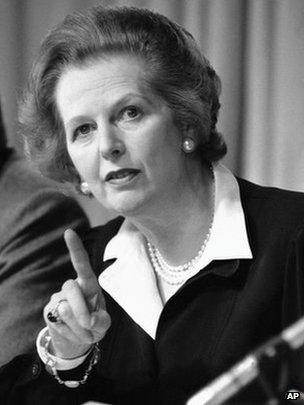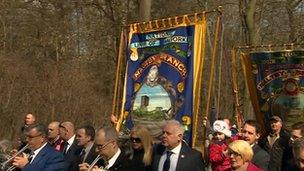Margaret Thatcher and the pit strike in Yorkshire
- Published
As prime minister during the 1984-5 miners' strike, Margaret Thatcher was a divisive figure in pit communities across the UK.
In Yorkshire, the mere mention of Baroness Thatcher's name is often likely to lead quickly to talk of the 1984-5 miners' strike.
With the news of her death at the age of 87, emotions remain high in Yorkshire's former pit communities about the miners' strike and the role of then Prime Minister Margaret Thatcher.
At times, that strike - lasting from 5 March 1984 to 3 March 1985 - almost seemed to be a battle of wills between the Barnsley-born leader of the National Union of Mineworkers (NUM), Arthur Scargill, and the Conservative prime minister.
In 1984, when there were 170 working collieries in Britain, employing more than 190,000 people, Mr Scargill obtained a "hit list" of mines the Thatcher government was planning to close.
The ensuing strike against job losses, for which the NUM controversially never held a national ballot among its members, pitted striking miners against Mrs Thatcher's government, the police and other miners, and led to divisions in families which remain to this day.
'Vindictive acts'

Arthur Scargill led the miners during the 1984-5 strike which ultimately ended in defeat
The bitter year-long stand-off between Margaret Thatcher, Arthur Scargill and the NUM has come to be seen as one of the defining events of the era - not least in Yorkshire where her legacy is often remembered less than fondly.
As Chris Kitchen, Yorkshire-based NUM general secretary, said: "Unfortunately for the vindictive acts she did to myself, my comrades and my family and for the mining community, I'll not be shedding a tear at her demise."
South Yorkshire saw some of the worst violence of the dispute - most most notably at British Steel's coking plant at Orgreave on 18 June 1984.
Those clashes saw about 10,000 striking miners go head-to-head with 5,000 police, and led to 93 pickets being arrested with 51 pickets and 72 police officers injured, according to South Yorkshire Police.
'Political springboard'
Darren Vaines, a former miner at Ackton Hall colliery near Pontefract, West Yorkshire, was on strike for the entire 12 months of the dispute and was at the so-called Battle of Orgreave.
"It's a very strange emotional feeling because her death brings back a lot of memories and opens up a wound that has never really healed," said Mr Vaines.

Margaret Thatcher went head-to-head with the NUM during the 1984-5 miners' strike
"The cut went so deep, people have never been able to forget about it. It's something they can never get out of their system.
"She used miners as a political springboard. She knew what she was doing and it was a horrible way to go about it."
But despite the clashes at Orgreave and at other picket lines across the country, Margaret Thatcher remained steadfast in her commitment to not give in to Arthur Scargill and the strikers.
Ultimately defeated, the miners eventually returned to work in pit communities in Yorkshire and across the country on 3 March 1985, a day of parades, colourful union banners, brass bands and high emotions.
Mick Dickinson who worked at Fryston Colliery near Castleford, West Yorkshire, said Mrs Thatcher would inevitably be remembered as a great leader by many - but they were unlikely to hail from Yorkshire's former mining communities.
"She will go down in history as one of the greatest post-war prime ministers thanks to the privatisation she was driving the country into, and some of the nationalised industries did need to change," he said.
"But I think she took the miners' strike too personally and it became a personal crusade. We have hate and resentment for what she did to the industry."
Fryston pit was closed in 1985 - one of a dozen Yorkshire collieries to close that year - and has since been demolished.
'Short-term profit'
With such a strong mining tradition in Yorkshire, Mr Kitchen from the NUM said animosity to Mrs Thatcher would remain strong even after her death.

A parade was held in Maltby at the weekend to mark the end of deep coal mining there
"I think you only need to go round the mining community and see the devastation that she left behind in her wake and also the nationalised industry that she ran down for the sake of short-term profit," he said.
"I think with the devastation she brought to the country she doesn't deserve any remorse or respect from me."
It was just a few days ago that the sight of hundreds of parading miners holding banners, led by a brass band, returned to the streets of a South Yorkshire mining town.
The event was to mark the end of deep coal production at Maltby Colliery 100 years after it first began there.
The Maltby Miners Welfare band led the miners' parade to the town's cemetery, where two wreaths were laid and a lump of coal buried.
As a result of Maltby's closure, only three deep coal pits now remain in the UK out of the 170 in operation in 1984.
- Published8 April 2013
- Published27 November 2012